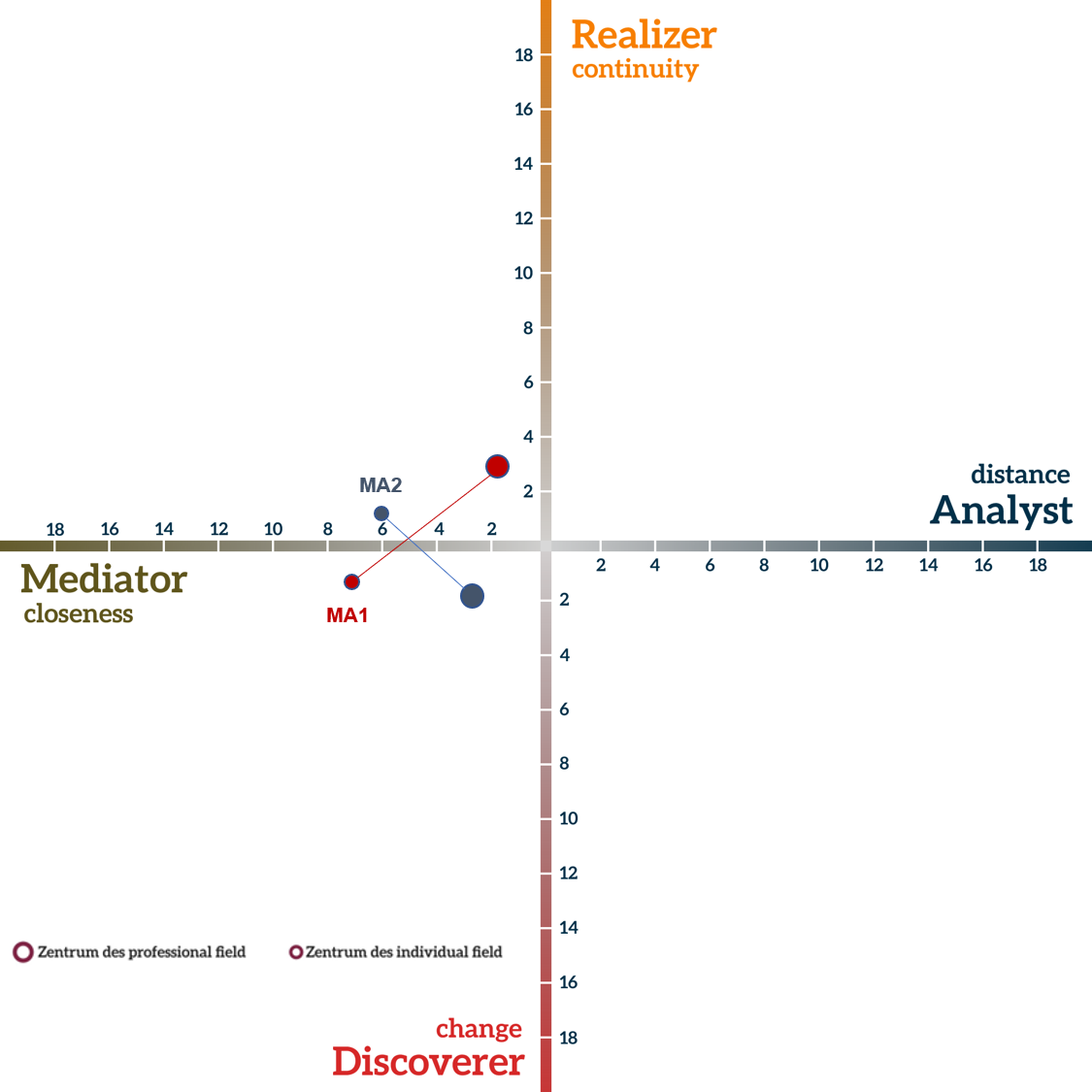Conflict Management
Resolving Team Conflicts
How team conflicts can be clarified faster and more sustainably with the Team Compass.

Conflicts are part of life
Disagreements and conflicts are inevitably part of living together. This affects both our private and professional lifes. We often find them disturbing and burdensome.
Are they bad though?
No, because development is not possible without diverging opinions and the discussion about the different perspectives. So, it’s about the ”how”.
Professional handling of conflicts
How do people deal with different perspectives and viewpoints?
Contentious culture
We need something like a constructive and appreciative approach to deviant positions - a kind of culture of dispute. If it becomes difficult, conflict management helps so that it does not escalate. But what if there is no conflict management or if it has ”failed” and the disputes have already escalated sharply?
When parties to the conflict themselves are no longer able to resolve their conflicts, the procedure of mediation for conflict clarification is appropriate. Conflict mediation resolves disputes without there being victors and losers.
Mediation
A basic assumption of mediation is that the parties to the conflict know best how to resolve it. In the escalation of the conflict, however, this knowledge first disappeared, because respect for divergent opinions and the will to empathize with the others have been lost.
We want to look at how it can be even better to capture already escalated and hardened conflicts and to clarify them as sustainably as possible.
What constitutes conflicts in a team?
In a conflict, different interests, goals, opinions, values, basic attitudes and personalities meet. This leads to tensions between the people involved or between entire groups and teams.
Effects of conflicts
A special feature of conflicts in teams is that the people involved are dependent on each other in some form and cannot simply avoid each other and thus the conflict.
The parties to the conflict are also aware of their feud. In the dispute, each conflict party wants to assert its position forcefully. This usually leads to strong feelings and emotions among the people involved. These subsequently promote escalation.
The impact of team conflicts is often demonstrated by the fact that employees invest more time and energy in the conflict than in the processing of their tasks. They may even sabotage the work of their colleagues or - sometimes - they flee into sickness.
If the disputes take a long time, this promotes the fluctuation in the company. Ultimately, long-lasting unexplained conflicts weigh on people and organizations, which can lead to significant malpractice costs.
How team conflict management works with the help of our Team Compass
Conflict resolution in practice
In a medium-sized company, two chief secretaries support the two managing directors. One is assigned to the CEO and the other to the CFO. In times of absence of the colleague, they represent each other.
Over the years, the relationship between the two has become increasingly difficult. Interventions by the managing directors, the HR department and the works council remain unsuccessful. Instead, the positions between the two secretaries are increasingly hardening.
The conflicts take on dimensions that also have a negative impact on operational processes and work results. At the latest from this point on, the two managing directors want to pull the line.
External support for conflict management
They agree that if the conflicts in the team cannot be resolved at least so far that the two employees can at least deal with each other professionally again, they would fire both. Not just one, no, both. The two secretaries also got informed of this precisely in the form - but do not change their behaviour.
Initiated by the HR department, a final attempt is to be made with external support. Because recruiting new and above all well-qualified personnel is currently very difficult due to the shortage of skilled workers and also costs a lot of time and money.
An external coach is assigned to mediate. In the order clarification conversation with the assigned coach both employees show themselves very combative and in no way ready for dialogue.
For example, one of the two secretaries said: „I don't care if I lose my job. If only the other gets fired, too!” Nevertheless, they both get involved in mediation.
The coach recommends the use of the Team Compass for this conflict mediation, which the two secretaries and the clients agree to.
How the conflict management process is designed
Before starting the actual mediation, the two secretaries complete the online questionnaires on the Team Compass in the form of a self-assessment. The coach then prepares the results so that they can be published during conflict mediation.
In the first session, the coach first presents the personality model that underlies the Team Compass. The two employees learn how their individual personalities are pronounced and reflect on how their personality shares correspond to concrete life situations.
In the following moderated dialogue, the body language of both changes noticeably and initial statements such as:
- ”Ah, that's why you always act like this in these situations.”
- ”She doesn't want anything bad for me.”
- ”She ticks very differently than I do.”
At this time, it becomes possible for the two to recognize the otherness of the other and at least to begin to accept her value-free. They are still far from appreciation. However, they both recognize that they have very different needs for communication, the organization of work and thus for their cooperation. For both, the biggest surprise is that they are very close to each other in their basic personalities. Both have large shares in the mediator.

In their opinion, the deviations in professional activity result in the different requirements and working methods of their managing directors. This recognition, understanding and initial acceptance leads to a significant increase in the willingness of both to resolve conflicts.
It is particularly interesting for both to see that they have developed with the focus in their professional profile on the vertical axis - i.e. between Realizer and Discoverer - in the quadrants in which their colleague has her personal focus.
In the next steps, the actual mediation takes place. In this process, the two employees interestingly repeatedly reference their team profile. When asked by the coach, they reply that it gives them an orientation, promotes understanding and supports the emphatic acceptance of others.
In the context of the clarification aid, it is possible to resolve the old conflicts, to develop a better understanding of the colleague and agreements accepted by both for further cooperation.
The result is a viable professional level of cooperation, which is also characterized by appreciation. For both secretaries, however, it is also clear: "We will not be best friends!" But that was and is not the goal. In several subsequent reviews, the two secretaries and the two managing directors confirm the sustainability of the clarification process. The two secretaries underline once again that the Team Compass still helps them in everyday life to find solutions if there are once again different perspectives and the cooperation is made somewhat more difficult.
The clarification help from the coaching point of view
In the subsequent reflection of the experienced coach, the use of the Team Compass contributed significantly to the fact that these very hardened conflicts were discussed comparatively quickly and could subsequently be clarified sustainably. The willingness to engage in the other and to value the other's otherness was clearly strengthened by the value-free personality model. The fact that both employees have found their way back in their profiles made it easier to discuss the actual topics and limitations. The Team Compass also gave the two secretaries an orientation for further cooperation after conflict clarification - similar to a map while traveling.
Make conflict mediations faster and more sustainable
If you too are active in the field of mediation and clarification, you will find a scientifically sound personality instrument in our Team Compass, with which you can expand your methodology spectrum and carry out your conflict resolutions even more effectively. In our Professional or Premium Memberships you can choose the most suitable form of collaboration with us.
